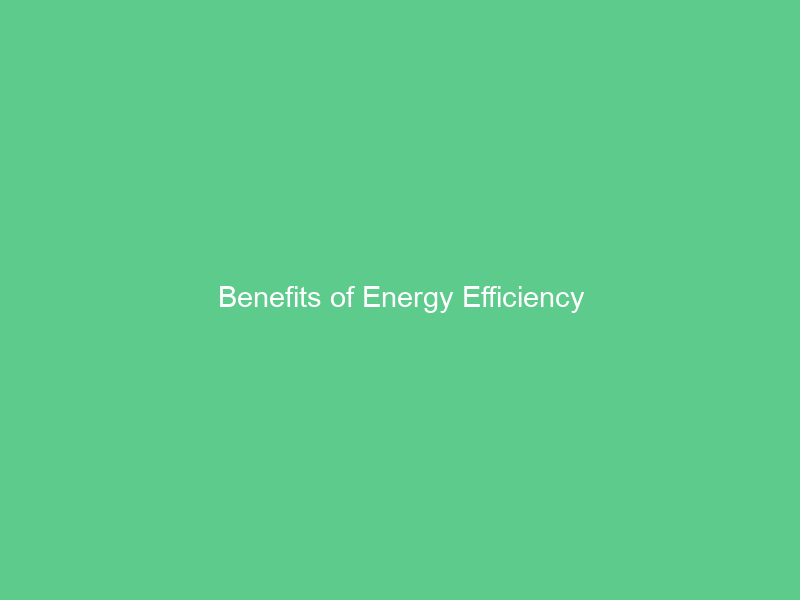Energy efficiency reduces fossil fuel usage and electricity bills while supporting sustainability initiatives and meeting additional development goals.
Energy efficiency measures can be cost-effective solutions to combat climate change and lower energy costs, so increasing investments and electrification rates should be prioritized.
Energy savings
Energy efficiency improvements are an effective way to lower electricity bills. Such improvements include installing smart thermostats, insulating homes and businesses, using ENERGY STAR appliances and lighting, as well as participating in demand response programs that offer rewards for reduced power usage during periods of peak demand. Businesses can also save energy costs by taking part in demand response programs which offer payments when participants reduce usage during such peak demand times.
Upgrades that make homes more energy-efficient may require an initial larger upfront investment; however, over time homeowners see significant savings on their electric bills as well as being able to reinvest these savings back into future energy upgrades and help meet future energy codes while decreasing penalties for noncompliance.
Energy efficiency measures help lower energy consumption and emissions, benefitting both the environment and families who face energy insecurity by making electricity more affordable – thus helping families avoid having to choose between paying their utility bill or purchasing food! Such benefits serve as powerful motivations for adopting more eco-friendly practices.
Environmental benefits
Energy efficiency reduces greenhouse gas (GHG) emissions and air pollution levels while also increasing environmental sustainability by decreasing fossil fuel-based electricity generation. Switching out old appliances for efficient models or increasing insulation can help homeowners lower their demand for power from coal or natural gas-fired power plants, thus helping conserve fossil fuel resources and ensuring more ecological sustainability.
Energy efficiency increases resilience of utility systems while decreasing reliance on imported resources, thus mitigating geopolitical risks and strengthening energy security.
Energy efficiency is a powerful strategy for meeting net-zero emissions goals and mitigating climate pollution, providing one of the few cost-effective strategies to do so and lowering energy costs for consumers – savings that could then be put toward other economic activities and social programs in low-income communities. Energy efficiency also provides access to clean, affordable energy solutions while improving environmental health while creating jobs in construction and retrofitting sectors of the economy.
Economic benefits
Energy efficiency policies help create jobs across various industries and can also relieve strain on the power system and improve grid resilience, cutting air pollution levels and healthcare costs in turn – creating a win-win scenario for everyone involved in its implementation.
Lack of information may prevent consumers from investing in energy-efficient equipment, for instance when they don’t realize that LED bulbs have longer lifespans than halogen lamps. This can be considered market failure as without accurate knowledge consumers are unable to make rational decisions and can only make snap decisions.
Also, many consumers today prefer buying products from socially responsible businesses. Millennials in particular place great importance on environmental sustainability and corporate culture when making purchasing decisions; therefore companies who take energy efficiency seriously may attract this demographic while increasing profits and building strong relationships with suppliers and customers.
Social benefits
Energy efficiency reduces overall energy demand, relieving strain on resources and ecosystems while mitigating climate change by limiting greenhouse gas emissions. Energy efficiency should form part of any sustainable development strategy and may reduce fossil fuel extraction/processing needs; make renewables more cost-effective; or help stabilize electricity prices.
Energy efficiency not only cuts household bills and enhances home comfort and quality, but it can also help families avoid financial insecurity – the difficult choice between paying utility bills and purchasing essential foods or other essentials – but it can also create jobs in the clean energy sector, thus lifting communities out of poverty.
Energy efficiency can save businesses money by cutting electricity costs and increasing productivity, while giving a competitive edge and improving social standing. Furthermore, adopting energy efficient practices shows shareholders that your company is open to adapting new technologies while remaining committed to running more efficiently over time.

